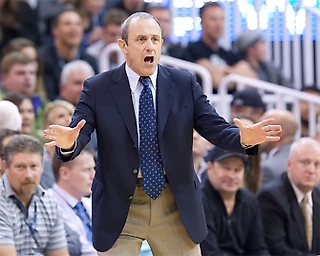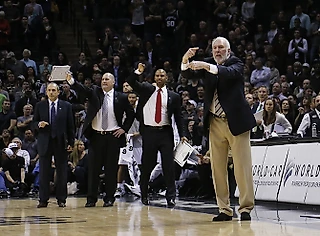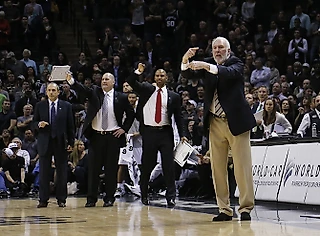When length matters
This entry is not about CSKA — Partizan series. We’ll get back to it once it’s finished. It’s not the time yet to analyze it. In a best-of-five series everything might change completely in the remaining three games.
For the first time since 2001 Euroleague returned to the best-of-five series concept. The season 2000-01 was the first one for the newly organized Euroleague. That year we had a strange combination: best-of-three series in the quarterfinal and best-of-five series in the semifinal and the final. There were many wins on the road in the playoffs that year. It was the first time when such a long playoff system was implemented in Europe. For example, FIBA had a best-of-three series in the quarterfinal followed by the Final Four.
That year we had a tough quarterfinal series against Olimpija Ljubljana. We won the first home game in overtime and won the second away game by 2 points. By that time we were undefeated for 33 games in a row, and still we struggled with a very young Olimpija team led by Sani Becirovic. I remember an incredible pressure during the first home game. It’s always like that when you play a best-of-three series. You know that you cannot miss your first shot at home. Otherwise, you will be on the brink of elimination, forced to win the two remaining games, one on the road, which is a rather difficult task. If you remember, this is exactly what happened to us last year against Olympiacos.
The best-of-five series in the semifinal have a completely different outlook, because you play the first two games at home. It gives a better team more chances to advance to the next round, as you can restore the home court advantage even if you lose one of the first two games at home. If you lose the home court advantage in a best-of-three series, you will have no backing space, as two consecutive wins are now mandatory. Being in a best-of-five series, you might focus on winning three games, no matter which ones, rather than focusing on winning the first game by all means. So you can be a little bit more relaxed. It’s also a bit easier for the referees, with a little less pressure on them.
The key to the best-of-five series is to perform consistently at a high level for two games in a row. Let me explain. If you lose game one, you instinctively try to bounce back from a bad performance, whether you are at home or on the road. The problem arises when you win game one. Instinctively, you relax and have the tendency to prepare the second game referring to the first one. You assume that if you repeat what you did well in the first game, you will win again. It’s nonsense. You cannot assume anything, as repeating the success depends on too many factors. Unfortunately, we all make this mistake. When I go home and I watch the tape, sometimes I also tend to think that way. But then I realize: nobody can guarantee me that we’ll be able to do it well again. You need to be even more alert, if you want to repeat the good performance you had in the first game.
This is why there’s such a high probability of splitting the first two games — 1:1. This is exactly what happened in 2001, in the final with TAU. We lost game one at home, then we bounced back in game two as we were hyper-motivated and more relaxed, because we had nothing to lose anymore. On the contrary, they were happy inside for the first win on the road and couldn’t repeat the level of their performance.
We went to Vitoria for games three and four. We had just won the Italy Cup that week-end. We knew we had to win. Ginobili played a great game, the team played a great game, we won by a big margin. They were under a tremendous pressure to win that game to protect the home court advantage they had taken from us.
In game four they just blew us out. By 20 points. We were one game away from becoming the first Euroleague champion and we had to start all over again. Game five at home was a very difficult one. We never got a big lead. We were 6-8 points up for 40 minutes, TAU still in the game, chasing us. It’s the most difficult type of game you can play, but we managed to win it.
Here is the point. At this highest possible level (with Oberto, Scola, Elmer Bennett, Timinskas, Stombergas playing for TAU, Ginobili, Rigaudeau, Jaric, young Matjaz Smodis, David Andersen, Rashard Griffith playing for Kinder, to name a few) both teams failed to play two strong games in 48 hours. In the Russian league, where we play back-to-backs in 24 hours, it’s rare that the home team takes both games. It’s very difficult to match the same level of intensity after the first win.
If you are a team that lost two games on the road, you must win two home games to keep the series alive. It puts you in a very difficult situation, as the other team might afford being patient.
The 2001 Euroleague semifinal series with Fortitudo comes to mind. We won the first two games at home. In the third game, we were 20 points down at the beginning of the forth quarter. I didn’t want my players to lose confidence before game four, so I told them: “Look, the game is finished. We have one quarter to play. Let’s see how the first two minutes will go. If we hit a couple of shots and cut their lead to 12-13 points, maybe, they will feel the pressure and will start making mistakes”.
This is exactly what happened. We had a couple of good plays, we scored, we made two stops. All of a sudden, we were down 12. They started panicking. They were throwing the ball around, while we were just playing our normal game. We outscored them 25-1 in eight minutes and won the game and the series. I don’t think something like that might have happened in a regular season game.
The funny memory is that Italian television broadcasting the game had the microphone at our bench during the time-outs. So everybody heard what I said. Later on, I was told how smart I was to play this trick using the reversed psychology. I thanked people for the compliment, but I told my players what I had in my mind. I honestly thought the game was over, and I didn’t want my players to get too frustrated by the loss. I didn’t play any mental game. It reminded me that we all live on reputation.
Like in school or college, if they think you’re lazy, even if you work very hard, it will be very difficult to change their opinion. Most of the times, they will consider you a lazy person, no matter what you do, once they made up their mind. The same story with banks lending you money. The more you have, the more you can borrow. It works that way in almost every aspect of life. If you do well in general, whatever you do looks good, even if you did something simple and obvious.
In playoffs, everybody is a little paranoid about protecting the home court advantage. It reminds me of tennis, where losing your serve looks like a disaster. No wonder, taking into consideration how fast they serve. But in basketball the truth is that upon improving the level of officiating over the years it became easier to win on the road. If you check the percentage of wins on the road now and 20 years ago, it would be totally different. 20 years ago, with two referees, it was almost impossible to win on the road, especially if one of two referees wasn’t strong and experienced enough.
In Euroleague you can see a high percentage of wins on the road, and that’s a good thing about Euroleague. It’s rare that officiating influences the game badly. Sure, everyone might have a bad night, but it cannot be a conspiracy. Even CSKA lost home games this year. Hopefully, we won’t lose any more.
I think coaches and players prefer best-of-five series. Playing best-of-three is harder, as the first game of the best-of-three is like a semifinal of the Final Four, too much is at stake. In the best-of-five you might even lose a key player to an injury, recover him and still keep your chances to win it all. In the best-of-three, one player has a bad night, team has a bad night, one player gets hurt and you are done. I think everybody prefers to have longer series.
It would be funny and great to see one day the Euroleague title decided in a best-of-seven series. Like in the NBA. It would be an incredible show. In Europe, we combine two systems: NBA playoffs and NCAA Final Four. College basketball in the US is all about single elimination games, because it emphasizes the competition and fans as main aspects of the show. In the NBA, to get the real champion and not the champion of one game, they protect a stronger team providing it with a home court advantage.
In Euroleague, we combine playoffs and the Final Four for television reasons. Personally — and this is not the disrespect for the organization, — I’d prefer going through playoffs until the end. This way, the champion is really the best team of the year, proving itself as the best on a larger amount of games. In this sense, I would like to see a lot of best-of-seven series. Imagine, we had a best-of-seven series against Maccabi in 2006 and 2008, or against Panathinaikos in 2007.
Honestly, I don’t think that the fans will like it less than the Final Four. The Final Four keeps alive the hope for four teams and four groups of fans. But the final series between two great teams would also be a big television show. And it definitely would be a better experience for local fans. That year with TAU we had 5 games attended by 10 thousand people each, both in Bologna and Vitoria. It was incredible. However it’s not my job, so I just take what I have. I respect the marketing reasons of Euroleague. Even though the title decided in single elimination games, in 48 hours, is something that burns you out. We’ve been lucky in CSKA to win something over the last several years.





I think it is fantastik that the best coach in europe share His wisdom with all of us.
Wow! Khryapa is amaizing, I think he or Lorbek should recive this years MVP. They deserve it!